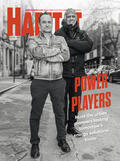HABITAT
Don’t Let Your Co-op Become a Pigeon Coop

Sane New Yorkers regard them as rats with wings, and they make use of the many tools to combat pigeons on their property. But things get complicated when a neighboring property owner doesn’t care that pigeons are emitting toxic piles of excrement in a shared space between buildings.
Such was the case on the Upper West Side, where pigeons set up housekeeping on a grocery store’s outdoor air vents and cooling system. Residents of a co-op that shares a courtyard with the grocery store hired an exterminator, but the nests remain. The store’s management did not respond to calls. What’s a co-op board to do?
“The mere presence of pigeon droppings in the courtyard is an unsanitary condition” and could be grounds for a violation, Kempshall McAndrew, a real estate lawyer at Anderson Kill, tells the New York Times’ Ask Real Estate column. The board should keep the courtyard free of pigeon droppings in case an inspector visits.
Beyond that, McAndrew advises the co-op board to call the Department of Health and Mental Hygiene directly, bypassing 311. The board should photograph the area, documenting the nests as the source of the problem. It should also keep records of calls to the grocery store and of the exterminator’s efforts.
If such measures fail? The board could sue the grocery store for an injunction and for monetary damages.



